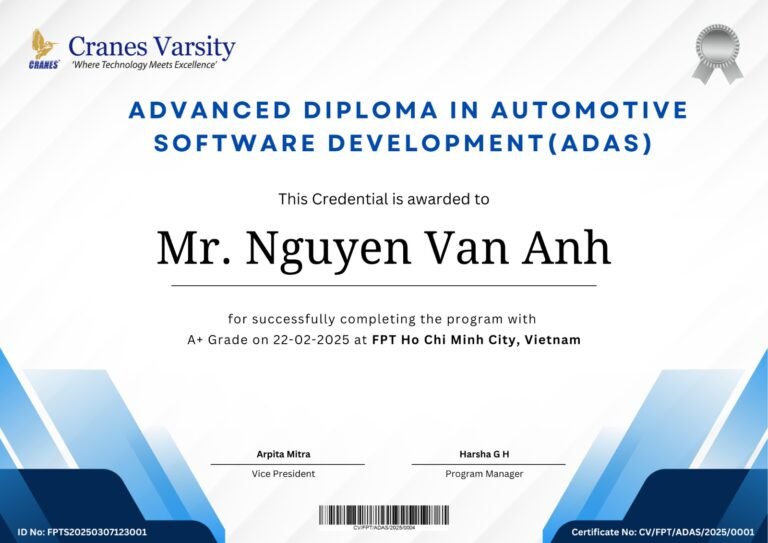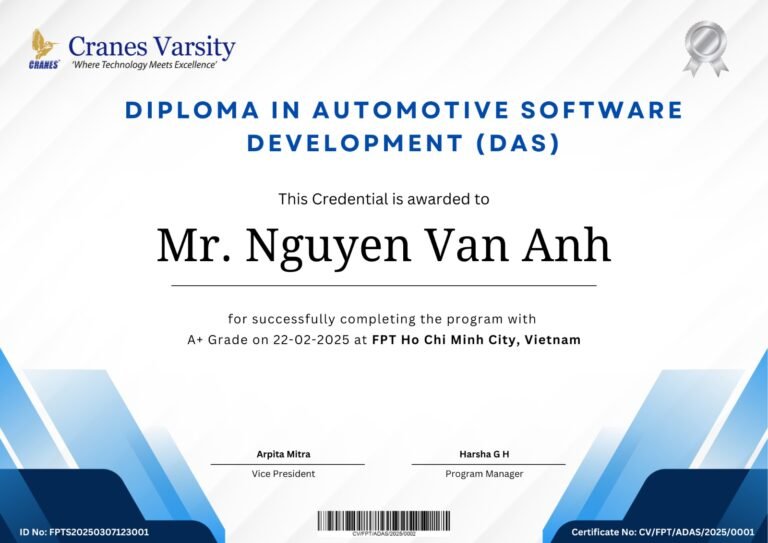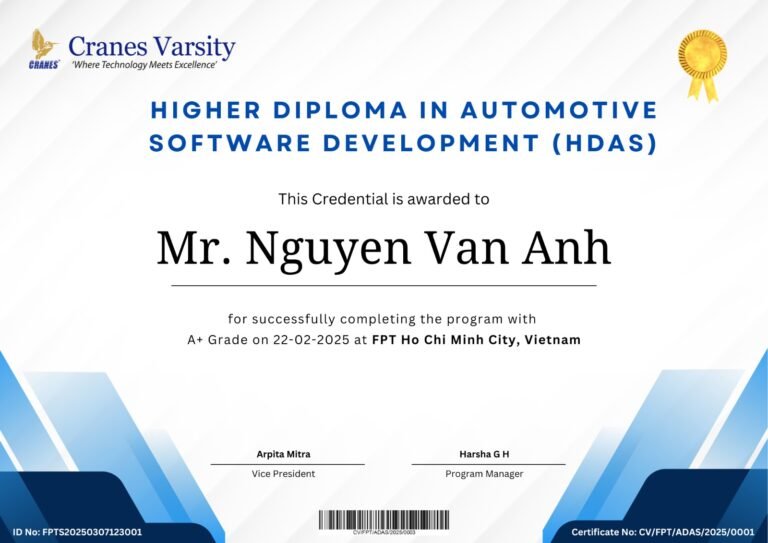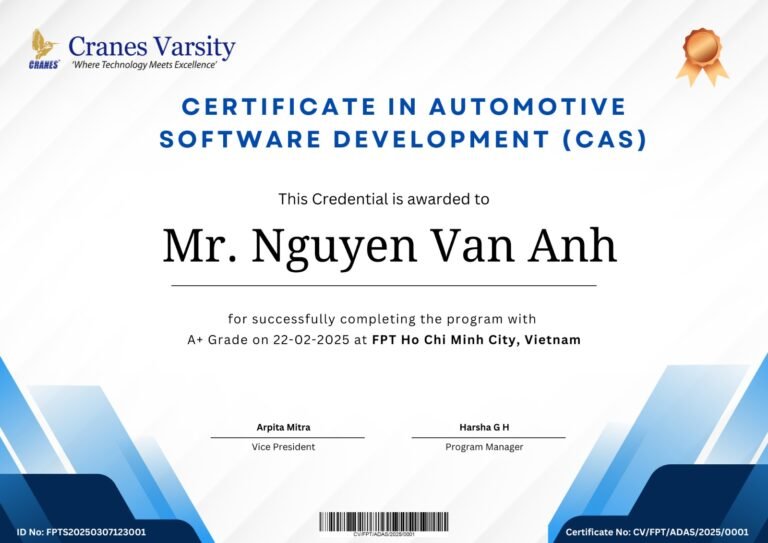Automotive Software Development Program in Collaboration with FPT University
The Automotive Software Development Program, a collaborative initiative between Cranes Varsity and FPT Academy International, has launched, delivering specialized education for aspiring automotive software professionals. Cranes Varsity is actively contributing its expertise through tailored curriculum customization, guidance on industry-focused capstone projects, and a rigorous evaluation process that emphasizes both technical proficiency and practical application. To enhance the learning experience, the program utilizes seamless LMS integration, ensuring an efficient and effective educational journey.
Global Embedded Market Analysis
- The Automotive Software Market size is estimated at USD 10.07 billion in 2024, and is expected to reach USD 29.30 billion by 2029, growing at a CAGR of greater than 22% during the forecast period (2024-2029).
- By 2030, the global automotive software and electronics market is expected to reach $462 billion, representing a 5.5 percent CAGR from 2019 to 2030.
- The Asia Pacific vehicle embedded software market size was valued at USD 10.24 billion in 2022 and is projected to grow from USD 11.46 billion in 2023 to USD 27.57 billion by 2030, exhibiting a CAGR of 13.4% during the forecast period.
Program Details



Program Modules
Semester 1 – Automotive Infotainment Systems Development
- C/C++ Programming for Embedded Systems
- Qt Application Development
- Basic Analog & Digital Electronics
- Basics of Automotive
Semester 3 – Advanced Automotive Embedded Systems Development & AUTOSAR Introduction
- SoC Programming
- Autosar Overview
- CAN Protocol
- Automotive Software Testing
Semester 2 – Embedded Systems Development for Automotive Applications
- Basic Java Programming
- Android Automotive
- Embedded System Overview
- Booting process and Boot Loader
- Linker and Memory Mapping
Semester 4 – Comprehensive Development of Automotive and AUTOSAR Systems
- MCAL Introduction
- Automotive Cybersecurity
- Testing guideline
- Electric Vehicles and Latest Automotive Trends
Semester 1: Certification in Automotive Infotainment Systems Development
- C/C++ Programming for Embedded Systems
- Qt Application Development
- Basic Analog & Digital Electronics
- Basics of Automotive
2. Expertise in microcontroller programming, with best practices in embedded C/C++ development
3. Design and develop GUI applications using Qt
4. Understand the principles of analog and digital electronics, circuit analysis, design, and troubleshooting.
5. Acquire knowledge of automotive industry practices, systems, safety features, and the relevant standards and regulations.
1. User Authentication
2. Menu Navigation
3. Data Visualization
4. Audio/Video Playback
1. Embedded Software Engineer
2. Embedded Systems Developer
3. Firmware Engineer
4. Embedded C/C++ Developer
5. Automotive Software Engineer (Infotainment)
6. Infotainment System Developer
7. Automotive Application Developer
8.Qt Developer (Automotive Applications)
9. Automotive UI/UX Developer
2. Eclipse or Visual Studio IDE
3. Debugging tools (gdb, etc.)
Semester 2: Diploma in Embedded Systems Development for Automotive Applications
- Basic Java Programming
- Android Automotive
- Embedded System Overview
- Booting process and Boot Loader
- Linker and Memory Mapping
2. Hands-on experience in developing applications for Android Automotive
3. OS Expertise in Embedded systems fundamentals, including ARM architecture, GPIO, communication protocols
4. Expertise in Android Automotive apps, integrates media and navigation APIs, and follow safety and driver distraction guidelines for app design.
5. Master linker scripts, memory allocation strategies, and techniques for optimizing memory usage and performance in embedded and automotive applications.
1. Embedded application using
C++, Qt
2. Android for automotive systems
3. Integrate Android Automotive
OS with embedded systems
4. Prototype Development
2. Embedded Systems Engineer
3. Android Automotive App Developer
4. Embedded Software Engineer
5. Automotive Systems Engineer
2. Android Studio or Eclipse
3. Android Emulator or physical device
4. Git version control
5. Android Automotive SDK and NDK
6. Embedded Linux or Automotive Grade Linux
7. QEMU or virtualization software
8. GNU Linker (ld)
9. GNU Compiler Collection (GCC)
Semester 3: Higher Diploma in Advanced Automotive Embedded Systems Development and AUTOSAR Introduction
- SoC Programming
- Autosar Overview
- CAN Protocol
- Automotive Software Testing
2. Familiarity the AUTOSAR architecture, software components, and how to design and implement automotive software using AUTOSAR standards, ensuring compliance with industry requirements.
3. Master communication protocols like CAN, LIN, and Ethernet.
4. Develop embedded software for automotive applications, using real-time operating systems (RTOS).
5. Gain knowledge and practical experience in testing automotive software, using tools like JUnit, Selenium, and CANoe.
2. Embedded Systems Engineer
3. Automotive Software Engineer
4. Automotive Security Engineer
5. Automotive Software Tester
2. SoC design tools (e.g., Vivado, Quartus)
3. Embedded system development tools (e.g., GCC, IAR)
4. RTOS and device drivers
5. AUTOSAR Development Tools (e.g., VectorCAST, EB tresos)
6. Modeling tools (e.g., Enterprise Architect, MagicDraw)
7. Simulation tools (e.g., Simulink, SystemC)
8. CANoe
9. LINWorks Selenium
10. Appium
11. JUnit
12. TestNG
Semester 4: Advanced Diploma in comprehensive Development of Automotive and AUTOSAR Systems
- MCAL Introduction
- Automotive Cybersecurity
- Testing guideline
- Electric Vehicles and Latest Automotive Trends
1. Gain a deep understanding of automotive security threats,
vulnerabilities, and industry regulations.
2. Proficiency in Vehicle Networking Security
3. Experience in Automotive Software Testing
4.Understanding of Electric Vehicle Technologies
5. Familiarity with Connected Vehicle Technologies
6. Competence in Autonomous Vehicle Development
7. Hands-On Experience with Automotive Security Tools
8. Exposure to Industry Standards and Compliance
1. Automotive Cybersecurity Engineer
2. Embedded Software Engineer
3. Automotive Security Architect
4. Automotive Test Engineer
5. Connected Vehicle Engineer
6. Artificial Intelligence (AI) Engineer
(Automotive)
2. MCAL Configurator
3. AUTOSAR-compliant operating systems
4. VectorCAST, CANoe, Burp Suite, Metasploit, Wireshark, CANoe
5. Automated testing frameworks (Pytest, Unittest)
6.Test automation tools (Selenium, Appium)
7.Infotainment system simulation tools (e.g., CANoe)
8. Automotive standards and regulations documents
9. Automotive-grade Linux (AGL)
10. Automotive Safety Integrity Level (ASIL) tools
11. IoT development boards (e.g., Raspberry Pi)
12.V2X communication simulation tools (e.g., OMNeT++)
NEWS & EVENTS
News Links
FPT partners with India’s Cranes Varsity for automotive software training
Push up smart car software training in Vietnam
FPT joins hands with Indian giant to train AI engineers, turning Vietnam into a global automotive software supply chain center
FPT partners with Cranes Varsity to train smart automotive software engineers
FAI delegation visited and worked with three leading Indian Automotive enterprises
Certification Sample
GLIMPSE OF THE LAUNCH


















